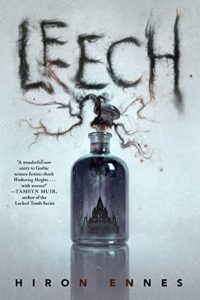Karen Burnham Reviews Short Fiction: Clarkesworld, Fiyah, and BCS
 Clarkesworld 6/19
Clarkesworld 6/19
Fiyah Spring ’19
Beneath Ceaseless Skies 6/6/19, 6/20/19
Clarkesworld starts its June issue with a gut punch of a story, “The Painter of Trees” by Suzanne Palmer. Colonizers of an alien world have a society with very strict protocols. As their terraforming efforts kill off the last of the indigenous population, one colonizing individual maintains contact with the last representative, Tski, hoping to gain insight from them and their native art forms. We switch perspectives between scenes in the colonizers’ council and the interactions with Tski. There’s mystery about exactly which council member is also talking to Tski, and just how deep their hypocrisy goes in terms of not being willing to rock the boat and attempt to save these beings. After Tski’s death, they attempt to immerse themselves in the painted art form of the title but fail to achieve anything close to the same depth of the originals. The wrenching part is how deeply self-centered even their meager attempts at understanding and appropriation are in this context; this story lays bare a lot of the self-glorification on display when colonizers attempt to speak for and “appreciate” native cultures (a trap I’m sure I’ve fallen into more than once). Palmer manages all these layers while also producing a solidly constructed and engaging pure science fiction story.
Bo Balder‘s story “Erdenweh” also addresses colonization, and here the sufferers are the colonists themselves. There have been a rash of suicides among settlers on an alien world, despite solid mental health infrastructure in place. One of the therapists starts researching the patterns and begins to realize just how harmful it can be to take organisms out of their native contexts: contexts that include dirt, germs, gut bacteria, and all kinds of “unpleasant” things that might be accidentally sterilized on the way to space. More than most science fiction, this focuses on humans in an ecological context, an interesting system-level perspective.
Staying out on distant planets, Eric Del Carlo delves deeply into the intersection of religion and politics in “Said of Angels“. The story is focused through the character of the Arch Hierophant, a supreme religious authority whose role spans huge swaths of the galaxy. We learn about his humble origins and the luxurious planetoid which he now inhabits, meant to elicit awe from all who come to petition him. An age-old religious question has bubbled up and demands his response: he has to weigh what he believes to be the truth vs. what he believes the political consequences of the decision might be. We get lush descriptions of the different aliens and societies involved, plus the introduction of a human priest, Roark, charmingly out of his element and a useful sounding board for the Heirophant. This story put me in mind of some of the baroque touches of Andreas Eschbach’s The Carpet Makers, and I would enjoy reading more in this universe.
Fiyah returns to themed issues with #10, and this time the topic is hair. These four original stories make it very clear how much hair is a source of pain and pride, especially to Black women. “In That Place She Grows a Garden” by Del Sandeen gives us Rayven, a girl on scholarship to a private school, who is forced to cut her dreads when a new principal starts uniquely enforcing the dress code on her. Flowers start blooming from her scalp, driving the principal nuts, and serving as some protection to Rayven. “My Snakes” by Frieda Vaughn moves to Europe, where a mixed-race girl being raised by a white mother has her hair constantly and painfully controlled. As she grows older she starts to let it grow freer, and the snakes that are embodied in it speak to her of her history and mythology that’s been long suppressed. This is a journey of a character reclaiming herself as she grows up. “No Late-for-School” by Shari Paul takes us to the Caribbean, where a woman’s boyfriend sends her to one of his ex-girlfriends to get her hair done because he doesn’t like it when she starts to grow it natural. When she starts to grow feathers out of her scalp, she suspects that the ex, and her boyfriend, are up to something rather more sinister. The voice of this character and her righteous indignation recounting the events to her online followers are absolute gold.
Finally “While Dragons Claim the Sky” by Jen Brown is a secondary-world fantasy where “coif mages” usually weave magic into hair. Omami wants to go to college and seems to have developed a form of wish magic; meeting up with Myra, a knight entering a tournament who might win noble patronage, seems to be her ticket. They make quite the odd couple as they near the tournament, neither quite understanding the other, until they run right into the corruption at the top of their society. A very satisfying adventure story.
I suspect Brown’s story could have easily found a home at Beneath Ceaseless Skies, where we often find the idea of magic being painstakingly crafted into physical objects. A recent example in issue #280 is “A Handful of Sky” by Elly Bangs. Here the rich can afford Tailored clothing made of exotic materials (refined by the working class who suffer immensely) and with many magical enhancements. Jorren is an exiled Tailor who was once the best and now scrapes by making nice clothes out of counterfeit materials. An outlandish commission to make a coat from the sky itself comes her way (putting me in mind of an excellent R.K. Duncan story from issue #277, where a powerful coat was made of thousands of bones). Jorren sneaks back into the high city, meeting an important figure from her past, to see if such a coat could be made. If it can, it might finally spark what appears to be a much needed class revolution.
Jumping back to issue #279, we have two stories about women seeking healing. In “Revival” by Lisa M. Bradley, Carmen goes to a tent revival seeking healing for a disfiguring condition. Instead she finds Swift, a kind man who becomes her lover. Swift, of course, has a secret past, and Carmen enlists the help of her family to protect him from it. “Silver Springs” by T.R. North moves to 19th-century Florida, where a young woman’s parents are taking her on a boat tour to visit sin-eating mermaids. They hope to cure her of her kleptomania, and she’s willing to play along. She palms a little extra silver to give to the mermaids in case things don’t work the first time, and ends up in a much more extended interaction with her mermaid than she could have imagined. Florida’s weirdness is a gift that keeps on giving to speculative fiction writers.
Recommended Stories
“A Handful of Sky”, Elly Bangs (Beneath Ceaseless Skies 6/20/19)
“Said of Angels”, Eric Del Carlo (Clarkesworld 6/19)
“The Painter of Trees”, Suzanne Palmer (Clarkesworld 6/19)
“My Snakes”, Frieda Vaughn (Fiyah Spring ’19)
Karen Burnham is an electromagnetics engineer by way of vocation, and a book reviewer/critic by way of avocation. She has worked on NASA projects including the Dream Chaser spacecraft and currently works in the automotive industry in Michigan. She has reviewed for venues such as Locus Magazine, NYRSF, Strange Horizons, SFSignal.com, and Cascadia Subduction Zone. She has produced podcasts for Locusmag.com and SFSignal.com, especially SF Crossing the Gulf with Karen Lord. Her book on Greg Egan came out from University of Illinois Press in 2014, and she has twice been nominated in the Best Non Fiction category of the British SF Awards.
This review and more like it in the August 2019 issue of Locus.
 While you are here, please take a moment to support Locus with a one-time or recurring donation. We rely on reader donations to keep the magazine and site going, and would like to keep the site paywall free, but WE NEED YOUR FINANCIAL SUPPORT to continue quality coverage of the science fiction and fantasy field.
While you are here, please take a moment to support Locus with a one-time or recurring donation. We rely on reader donations to keep the magazine and site going, and would like to keep the site paywall free, but WE NEED YOUR FINANCIAL SUPPORT to continue quality coverage of the science fiction and fantasy field.







